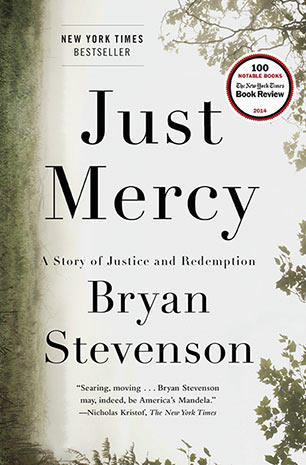The following is an excerpt from the introduction to Just Mercy: A Story of Justice and Redemption:
This book Just Mercy: A Story of Justice and Redemption is about getting closer to mass incarceration and extreme punishment in America. It is about how easily we condemn people in this country and the injustice we create when we allow fear, anger, and distance to shape the way we treat the most vulnerable among us. It’s also about a dramatic period in our recent history, a period that indelibly marked the lives of millions of Americans – of all races, ages, and sexes – and the American psyche as a whole.
When I first went to death row in December 1983, America was in the early stages of a radical transformation that would turn us into an unprecedentedly harsh and punitive nation and result in mass imprisonment that has no historical parallel. Today we have the highest rate of incarceration in the world. The prison population has increased from 300,000 people in the early 1970s to 2.3 million people today. There are nearly six million people on probation or on parole. One in every fifteen people born in the United States in 2001 is expected to go to jail or prison; one in every three black male babies born in this century is expected to be incarcerated.
We have shot, hanged, gassed, electrocuted, and lethally injected hundreds of people to carry out legally sanctioned executions. Thousands more await their execution on death row. Some states have no minimum age for prosecuting children as adults; we’ve sent a quarter million kids to adult jails and prisons to serve long prison terms, some under the age of twelve. For years, we’ve been the only country in the world that condemns children to life imprisonment without parole; nearly three thousand juveniles have been sentenced to die in prison.
Hundreds of thousands of nonviolent offenders have been forced to spend decades in prison. We’ve created laws that make writing a bad check or committing a petty theft or minor property crime an offense that can result in life imprisonment. We have declared a costly war on people with substance abuse problems. There are more than a half-million people in state or federal prisons for drug offenses today, up from just 41,000 in 1980.
We have abolished parole in many states. We have invented slogans like “Three strikes and you’re out” to communicate our toughness. We’ve given up on rehabilitation, education, and services for the imprisoned because providing assistance to the incarcerated is apparently too kind and compassionate. We’ve institutionalized policies that reduce people to their worst acts and permanently label them “criminal,” “murderer,” “rapist,” “thief,” “drug dealer,” “sex offender,” “felon” – identities they cannot change regardless of the circumstances of their crimes or any improvements they might make in their lives.
The collateral consequences of mass incarceration have been equally profound. We ban poor women and, inevitably, their children from receiving food stamps and public housing if they have prior drug convictions. We have created a new caste system that forces thousands of people into homelessness, bans them from living with their families and in their communities, and renders them virtually unemployable. Some states permanently strip people with criminal convictions of the right to vote; as a result, in several Southern states disenfranchisement among African American men has reached levels unseen since before the Voting Rights Act of 1965.
We also make terrible mistakes. Scores of innocent people have been exonerated after being sentenced to death and nearly executed. Hundreds more have been released after being proved innocent of noncapital crimes through DNA testing. Presumptions of guilt, poverty, racial bias, and a host of other social, structural, and political dynamics have created a system that is defined by error, a system in which thousands of innocent people now suffer in prison.
Finally, we spend lots of money. Spending on jails and prisons by state and federal governments has risen from $6.9 billion in 1980 to nearly $80 billion today. Private prison builders and prison service companies have spent millions of dollars to persuade state and local governments to create new crimes, impose harsher sentences, and keep more people locked up so that they can earn more profits. Private profit has corrupted incentives to improve public safety, reduce the costs of mass incarceration, and most significantly, promote rehabilitation of the incarcerated. State governments have been forced to shift funds from public services, education, health, and welfare to pay for incarceration, and they now face unprecedented economic crises as a result. The privatization of prison health care, prison commerce, and a range of services has made mass incarceration a money-making windfall for a few and a costly nightmare for the rest of us.
Copyright © 2014 by Bryan Stevenson. Reprinted by arrangement with Spiegel & Grau, an imprint of Random House, a division of Random House, Inc. All rights reserved.
Trump is silencing political dissent. We appeal for your support.
Progressive nonprofits are the latest target caught in Trump’s crosshairs. With the aim of eliminating political opposition, Trump and his sycophants are working to curb government funding, constrain private foundations, and even cut tax-exempt status from organizations he dislikes.
We’re concerned, because Truthout is not immune to such bad-faith attacks.
We can only resist Trump’s attacks by cultivating a strong base of support. The right-wing mediasphere is funded comfortably by billionaire owners and venture capitalist philanthropists. At Truthout, we have you.
Truthout has launched a fundraiser to raise $38,000 in the next 6 days. Please take a meaningful action in the fight against authoritarianism: make a one-time or monthly donation to Truthout. If you have the means, please dig deep.
